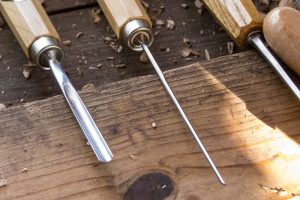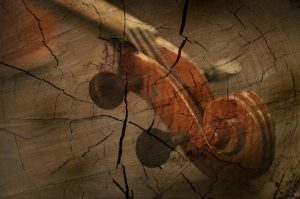blogger: Cynthia Ruchti
 So many similarities–writing and woodcarving.
So many similarities–writing and woodcarving.
As I was preparing this blog post, a writing friend with so much good going on in her career was gouged by news of a family medical crisis. A well-known author is battling a chronic disease that makes a daily word count seem an impossible Everest. Another bears the scars of a relationship rift. One author is saying goodbye to a dream house and moving across the country to downsize and regroup after her husband’s job loss. Still another lost a beloved family member and needs to stand-down from her aggressive speaking schedule.
Maybe no one believes the myth anymore that the writing life–and being published–is like sliding on polished marble.
Accolades, applause, admiration, advances, adoring fans, and a rustic cottage on the edge of a glassy lake with a charming antique desk near the window to catch the morning light while the words pour out like warm honey… 
But in case anyone does still hold to that myth, this is our reminder that writing shares more in common with woodcarving than with polished marble.
We don’t write because life is slick and easy.
It isn’t.
And writing won’t make it slicker or easier.
Ask any author. It won’t.
We write because life gouges us, reader and writer alike.
It reshapes us, carves its truths deep into the core of who we are.
The art emerges from the way light reflects along the ridges and creates contrast against the shadowy ditches. The stories are etched with sharp tools that remove the parts of us that hid what was possible.
When we write, we run our fingers over a smooth piece of wood–a blank page–sketch a design in our minds or on its surface, then pick up the tools and begin to dig away at what was flat but meaningless without the scars that create the art.
We create knowing that nothing of quality comes without cost.
But we’ve counted that cost and the pile of wood shavings that will be left behind when we’re done. We’re in search of what is within the piece of wood, begging to be revealed.
We edit, and allow our work to be edited by others, with tools as sharp as a woodcarver’s blades.
Why? Because we know that unless we remove excess, the words can’t sing. Unless we submit to the editing process, we’ll only manage to produce a rough, silk-snagging, choppy image that causes readers to squint to figure out what that thing is supposed to be.
We persist in writing, embracing–even leaning into–the pain.
The pain of waiting. Of rejection. Of a slip of the blade that defaces our intention and sends us back to the woodpile to choose another piece to work with. The pain of life’s weathering that both informs and enriches what we write.
We write anyway.
Who do you know who is experiencing a measure of success in his or her writing and publishing career? Don’t envy that person. Pray for and encourage him or her. Behind the scenes, a whole lot of gouging is no doubt shaping that life and those words. The result may be a thing of beauty. But it came at a price. If you look closely, you can see where the woodcarver’s chisel and sander have been.
Writing and woodcarving. So much in common. Click to Tweet.



Dear Cynthia, Thank you. Love this. So true. Dear writers. Life happens. It hurts. God heals. Takes time. Be patient. Be prayerful. Be persistent. Be blessed.
Thank you for supporting your fellow writers with these words, Elizabeth.
Interesting metaphor, Cynthia. Leaning into pain sure works for me right now as every step seems to drive a spear-point under my ribs, on the right side…where Jesus got stuck as proof of death. But I’d probably look at the whole thing in a different way, at least for myself.
* This morning I arose to bad having gotten worse, and a sharp, deep cough that produces blood. I mean…I got a BAAAD feeling about this.
* Strange thing, though, is that I’m not feeling bad, not in the heart. My mental playlist eschews ‘I Dreamed A Dream’ and ‘The Way We Were’, and I’m be-bopping through life to Van Halen’s ‘Jump’ and Twisted Sister’s ‘We’re Not Gonna Take It!’. My body may be grinding itself to gory dust, but my heart is full of light; I’ve lost my sense of tragedy, but never my sense of humour.
* There are no scars; I’m whole. The wounds that cancer seemed to give me were always in my imagination, childhood terrors from a painted demon in a fun-fair pantomime.
* And I wonder if this doesn’t to a degree serve as a warning that I have to be careful in my writing. My sense of proportion has changed, and it doesn’t mesh with those around me, especially Barbara. I know that my good cheer really grates on her sometimes, nails across the chalkboard, because it looks like I’m trying to invalidate her sorrow, the mourning process she lives daily. It looks like a lack of empathy, and that can alienate both wives and readers real quick. (Uh, use of the plural aside, I DO still only have one wife…)
* I guess Richard Bach said it best:
“Take your dying with some seriousness, however. Laughing on the way to your execution is not generally understood by less-advanced life-forms, and they’ll call you crazy.”
Andrew, I see your point and raise you one. 🙂 Some of the authors with the most deeply furrowed “gouges” also write humor. They’re not UNDONE by what they experience but rather textured. The art shines through as they allow new shapes to appear. They empathize more deeply, write from a place that understands that a mountain can’t exist without lowland around it, and a valley would not be defined as such if not for the mountains on either side.
Your perspective always makes us think, which is always a good thing. If anything, I’d hoped that this analogy would helps us be kind to one another, understand that behind every glorious word is likely a deeply carved story we may never hear about, and to not despise the marks of the Woodcarver. 🙂
Cynthia, that’s an excellent point, that deep empathy and even humour can come from the most profound wounding.
* And keeping the hidden marks in mind should definitely engender kindness when we realize that those hidden marks are a shared trait carried by all of God’s children.
* I guess my concern, a personal one, is that the healing of my soul has given me a kind of pride, as if I’d done it myself, and that it’s the kind of pride that really shows. It can come down to (and HAS come down to) putting on an Eeyore-face so that I don’t further antagonize those who don’t like my flippancy in facing death. It’s an uncomfortable mask.
* What it may come down to is this, that if one truly comes to dwell on the broad sunlit uplands in the face of crushing adversity, and does not maintain the capacity for pain and tragedy, one has lost the connexion with the two most vital words in the Bible:
“Jesus wept.”
* He wasn’t called the Man Of Sorrows for nothing.
Encouraging words to help us all jump into edits today. Ready, set, go! Hopefully, I’ll end up with something as lovely as what you described above.
Glad you were encouraged, Kristen.
Yes this!!!
This is excellent. I’m currently feeling the blade a bit and finding it hard to concentrate. Thank you for explaining where I am and what to do about it.
Hope this reminder helps, Kathy.
Love this! Especially this: “The stories are etched with sharp tools that remove the parts of us that hid what was possible.”
Thank you, thank you.
Good morning Cynthia, Normally I never leave a response on blogs. not to say I don’t read or follow some as I have on this website. While read this about your friend I can feel for her completely as I have been broken since childhood…I wanted to grow up to be an explorer I wanted to get away I wanted to survive. That was one of the reasons I started writing…and no it’s not a glorious job it takes a lot of effort you lay your hopes and dreams out there through you characters. but as you breath life into them they begin to be an extension of you. And yes the more you edit or get edited the more distinct one’s characters personality shines through. I have found many fascist of my personality in all my character so in a way I have explored the world and have gone to exotic places and I became an adventurer. Living a much fuller life, I may always be broken but through the pages of my books I have lived a full life that I never could.
Such a great point, Robert. We do get to explore and experiment and enjoy through our characters–a much fuller life!
Great post. Thank you, Cynthia.
Life does gouge us, and somehow, writing can change me in ways nothing else does.
May I quote you? “Writing can change me in ways nothing else does.”
A thing of beauty you’ve chiseled here, Cynthia. Thank you for the metaphor that puts into words our experience. I often think of us as clay pots the Creator is fashioning ~ the the woodcarving tools resonate.
Woodcarving is such a great image for me this morning, as my deepest tears overflow from painful circumstances etched into my life. And yet, I see too the texture of God’s love in my pain. Thank you for helping me to run my fingers over his truth and marvel at the glorious work he carves through the written word.
Karisa, beautifully said.
Praying grace and healing for your heart, Karisa, and thanking God for the beauty of the words and images you have shared. His Light shines in every syllable.
Thank you, Andrew.
Cynthia, this is probably one of the most profound and insightful things I have read in a very long time. I’ll likely be pondering this all day. Thank you for sharing it.
I’m still pondering, too.